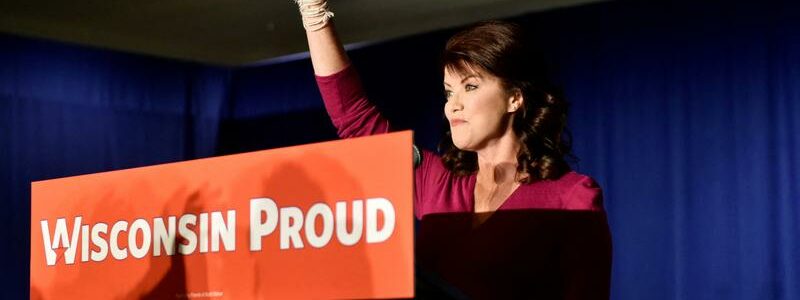
Abortion in focus in Wisconsin, Minnesota midterm primary voting
(Reuters) – A week after Kansas voters firmly rejected an attempt to restrict abortion, the issue will play a key role in Wisconsin and Minnesota midterm primaries on Tuesday as Republican candidates for governor vow to ban the procedure if elected.
In Wisconsin, the two top contenders for the Republican nomination to run for governor on Nov. 8, construction magnate Tim Michels and Lieutenant Governor Rebecca Kleefisch, say they will enforce a 19th-century abortion ban that has prompted providers to stop offering the procedure since the U.S. Supreme Court eliminated the nationwide right in June.
With a Republican-majority legislature, either candidate could push through abortion restrictions as governor. Democratic incumbent Tony Evers and his administration have filed litigation challenging the 1849 law while promising not to prosecute doctors who violate it.
The contest between Kleefisch and Michels is the latest proxy battle between Donald Trump and more moderate Republicans. The former president has thrown his support behind Michels, who has poured millions of dollars of his own money into the race, while former Vice President Mike Pence and former Governor Scott Walker have endorsed Kleefisch.
A similar dynamic is at play in Minnesota, where Republicans on Tuesday will select a nominee to take on Democratic Governor Tim Walz in November.
The leading Republican is former state Senator Scott Jensen, a physician who has pledged to try to ban most abortions and has cast doubt on the seriousness of the COVID-19 pandemic. Abortion remains legal in Minnesota, where Democrats control one of the two legislative chambers.
Last week’s Kansas ballot, which saw about 60% of voters support abortion rights, has raised Democrats’ hopes that the issue will mobilize their base in November and attract votes from independents and moderate Republicans. This follows the Supreme Court’s overturning of the Roe v Wade decision that legalized abortion nationwide in 1973.
Unlike the Kansas initiative, which was open to voters of all parties, Tuesday’s Republican primaries will reflect the preference of just Republican voters.
2024 PREVIEW
November’s election could serve as a preview of 2024, when Wisconsin will likely again be a major swing state in the presidential election. Trump, the former president who still maintains falsely that Democratic President Joe Biden’s statewide win in 2020 was fraudulent, has strongly hinted that he intends to run for a third time.
Republicans on Friday named Milwaukee as the site of their 2024 national convention, underscoring the state’s strategic importance.
Kleefisch and Michels have both questioned the 2020 election results, following Trump’s lead. At a Friday night rally with Trump in Waukesha, Michels declared that “election integrity” would be his top priority if elected.
The winner should avoid focusing too much on 2020 in the fall, when the general electorate will include more Trump-skeptical voters, said Bill McCoshen, a veteran Republican strategist based in Madison.
“It’s manifestly in the winner of the primary’s interest to focus on the future, not the past,” he said.
Trump-backed candidates have recently prevailed in statewide races in Arizona and Michigan, though his overall endorsement record is somewhat mixed.
Also in Wisconsin, Democrats will choose a candidate to take on U.S. Senator Ron Johnson, who is perhaps the most vulnerable Republican senator. Lieutenant Governor Mandela Barnes, who would be the state’s first Black U.S. senator, is widely expected to win the nomination.
The battle for Johnson’s seat could determine which party controls the Senate. The chamber is currently split 50-50 with Democratic Vice President Kamala Harris casting tie-breaking votes, as she did on Sunday to advance a sweeping domestic bill intended to fight climate change, lower healthcare costs and raise taxes on the biggest corporations.
While it is unclear if Democrats will be able to hold their razor-thin Senate majority, Republicans are favored to win back control of the U.S. House of Representatives, which would enable them to block much of Biden’s legislative agenda and initiate politically damaging investigations. Biden’s low approval ratings, coupled with persistent inflation and recession fears, have weighed on Democrats’ chances.
Tuesday also brings a special election in Minnesota for the U.S. House seat left vacant when Republican Jim Hagedorn died in February after a battle with cancer. Democrat Jeff Ettinger, the former CEO of Hormel Foods, is running against Republican Brad Finstad, a former agricultural official in the Trump administration.
Voters in Connecticut and Vermont will choose nominees for congressional and statewide races as well.
Source: Read Full Article